Professors Present Last Lecture Before Retiring
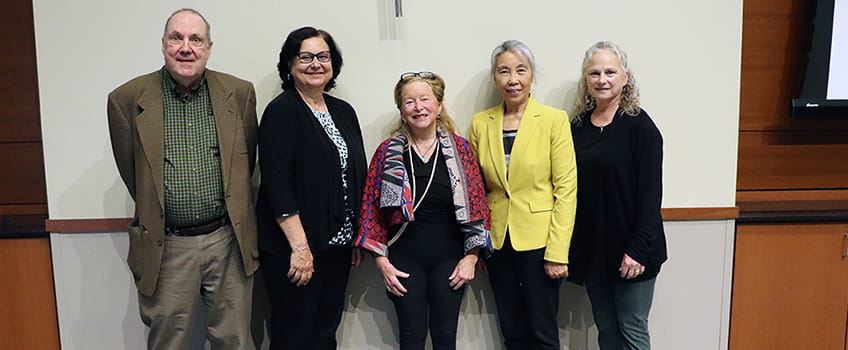
From left, David Burdick, Amy Hadley, Board of Trustees member Nancy Davis, Weihong Fan and Lois Spitzer at this year's Last Lecture.
Galloway, N.J. — Even though it’s only in its third year, the Last Lecture has become one of Interim Provost Marissa Levy’s “absolute favorite end-of-the-year traditions.”
“It is my distinct pleasure to say that I can’t wait to hear what you’ve chosen,” she said. “I have worked with all four of you in some capacity, either advocating for more resources on campus or for our students.”
The event gave four faculty members 20 minutes to talk about anything they wanted. The faculty members who gathered in the Board of Trustees Room in the Campus Center on April 24 included:
- Amy Hadley, associate professor of Communication Disorders
- Lois Spitzer, associate professor of Teacher Education
- Weihong Fan, professor of Environment Studies
- David Burdick, professor of Psychology
Amy Hadley: ‘Let’s Talk About Play’
Hadley focused her last lecture on a freshman seminar she taught for many years — play and why it’s so important.
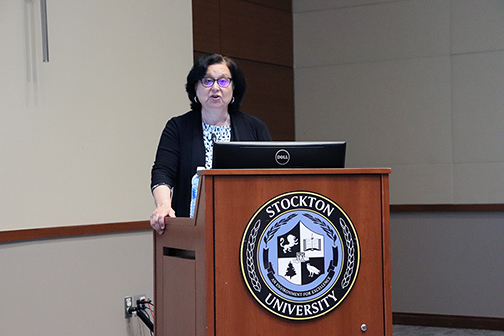
“I would say to the students at the beginning of the semester, ‘You are here at Stockton. Your parents have told you it’s time to stop playing around and get serious,’” Hadley said. “I’m here to tell you to never stop playing. You need to play.”
She went over eight different types of play personalities, which are based on situations, places or objects that we find engaging. Most of us are a mix of the joker, the kinesthete, the explorer, the competitor, the director, the collector, the artist/creator and the storyteller, Hadley said.
So closed her talk by asking what the word Lego stands for.
“Translated into English (from Dutch), it roughly means ‘play well.’ So, in closing, I would like to say to you all, ‘Play well,’” she said.
Lois Spitzer: ‘The Decline of World Language Programs: What Does this Mean for Higher Education?’
Spitzer’s talk began with some striking numbers about the enrollment decline of language classes at colleges and universities in the United States. From 2016 to 2022 the number of students studying languages other than English has fallen 15.4% from 912,829 in 2016 to 772,150 in 2020. She also mentioned how some schools, such as West Virginia University, have drastically cut back foreign language majors and minors.
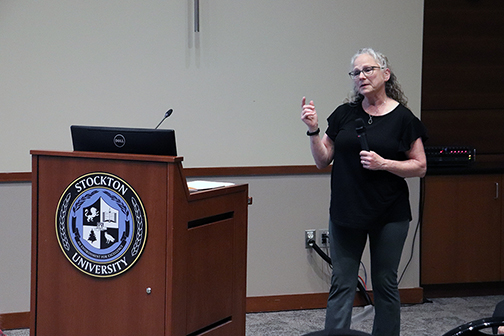
And she brought up how the advent of artificial intelligence has made it easier for us to communicate with those who speak other languages. But she cautioned that there’s a negative tradeoff to this trend. Quoting Eric Adler from an article in The Chronicle of Higher Education, Spitzer said “we deny students the opportunity to participate in and engage deeply with other cultures, to fathom how our language shapes our view of the world, and to do the hard work that fosters meaningful cross-cultural interactions and mutual respect.”
How can all of us help to mitigate the decline?
“We as faculty can consider leading study-abroad tours. We have a lot of extremely talented faculty members who have great varied interests and have already taken our students to wonderful places,” she said. “And if you ever talk to students who come home from study tours, they are bursting at the seams from excitement.”
Weihong Fan: ‘GIS Technology for Service Learning Through Web Mapping’
Fan’s lecture introduced many in the audience to geographic information systems, which provide spatial information for problem solving and decision-making processes about locations.
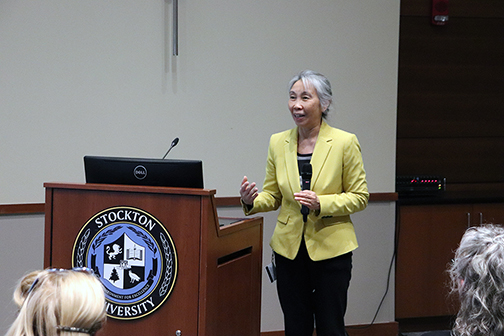
“This is using science based on scientific principles,” she said. “Our students use this technology for exploration of nature for discovery and finding out where or why things happen in a particular region or place.”
She discussed how this technology can be used to gather data and map it online to determine what areas in South Jersey might have the highest incidence of food insecurity.
“This data can be archived and become useful tools for tracking and monitoring,” she said. “It’s not only useful for us as professionals to find scientific insight, but also it’s useful for anyone who is interested in questions about a particular location.”
She also mentioned that the future for employment in this field is very bright with the projected GIS analyst growth rate at 9% and salaries for GIS analysts have increased 8% in the last five years.
David Burdick: ‘Why Stockton’
Burdick was so impressed with his fellow retirees’ speeches that he threw out the planned remarks for his last lecture.
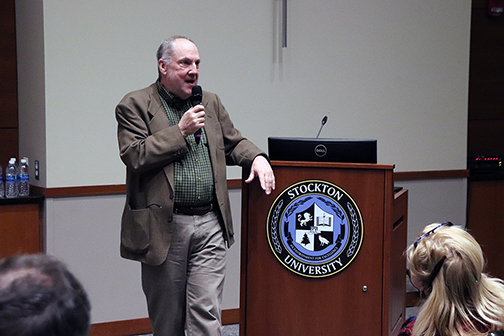
“Do any of you find that you create a Power Point, a lecture, a presentation, you are so overprepared, you know what you are doing and you walk in the door and you say, ‘Heck with this, let’s do something else.’ And then you are much more effective,” he said. “So, I want to try and do a little of that right now.”
He started by saying each of the previous lectures all tied into his theme and that all of the speakers had one thing in common — a passion for the liberal arts.
He then spoke about how his major area of research, gerontology, led him to become the founder and executive director of the Stockton Center on Successful Aging. He praised Stockton for helping him connect with others.
“Making connections was a powerful initial concept for Stockton,” he said. “This place, by design, wants to bring us together, to connect us.”
And he concluded with a challenge to the audience and the university community.
“I think it’s important for us to believe in each other, realize that we walk on common ground and help each other out through times that are not going to get any easier for the humanities, for the languages,” he said. “Resilience is we are better in this together.”
— Story and photos by Mark Melhorn


